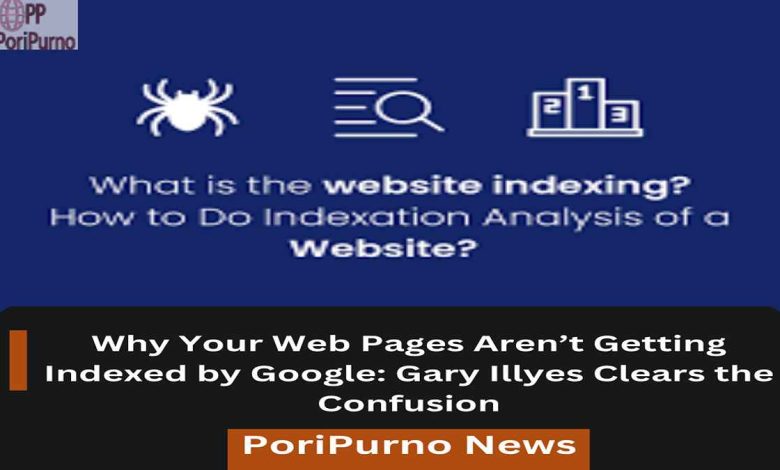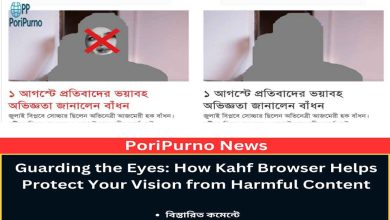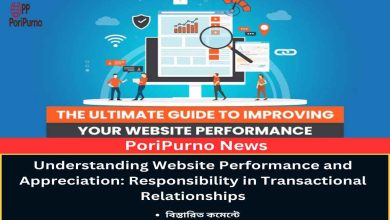Why Your Web Pages Aren’t Getting Indexed by Google: Gary Illyes Clears the Confusion

PoriPurno News Desk | August 02, 2025
If your website’s pages are not getting indexed by Google, you’re not alone. Webmasters across the world are increasingly frustrated, wondering why their carefully crafted content isn’t showing up in search results—despite ticking all the traditional SEO checkboxes. From burning cash on outdated SEO tricks to obsessing over domain history and keyword density, the confusion is rampant.
But now, Google’s own Gary Illyes, a well-known analyst and public liaison for search, has brought much-needed clarity to the issue. In a recent update, Illyes shared a definitive breakdown of what factors actually influence whether a webpage is indexed, and which ones do not.
As web publishers in Bangladesh and beyond attempt to decode Google’s ever-evolving algorithm, understanding these signals can be the difference between online success and total invisibility.
What Does Matter for Indexing
Illyes identified a set of eight concrete signals that influence Google’s decision to index a webpage. These are:
- Country – Localization matters. Your website’s geographic relevance (via ccTLDs, server location, or Search Console settings) plays a role in determining if it’s worth indexing for specific regional audiences.
- Language – Google’s indexing is language-sensitive. Content must be in a recognizable and indexable language.
- HTTPS / Secure Site – Security is not just a ranking factor. Google gives preference to HTTPS sites during indexing decisions as well.
- Core Web Vitals – Page performance, load speed, and user interaction metrics heavily influence both ranking and indexing.
- Links (Not Nofollow) – Backlinks from reputable sources signal value and can drive indexing, but links must be followable.
- Content Recency and Freshness – Google prefers up-to-date, relevant content. Fresh content is more likely to be indexed.
- Spam Policy Violations – Sites with spammy content or links are less likely to be indexed. Clean up your SEO act.
- Hreflang Tags – Proper implementation of
hreflangensures that multilingual or region-specific pages are indexed correctly.
What Does Not Matter for Indexing
This is where many digital marketers may feel a jolt. Illyes clarified that several long-held SEO beliefs are actually myths—at least when it comes to indexing. These do not influence whether a page gets indexed, even if they matter for other SEO purposes:
- Domain age and history
- Structured data (schema markup)
- XML sitemap
- Crawlability (surprisingly!)
- Link velocity (speed of gaining backlinks)
- Logical internal linking
- Readability metrics
- Topical authority
- Content depth or comprehensiveness
- Matching user search intent
- Keyword in H1 tag
- EEAT (Experience, Expertise, Authority, Trust)
This list is a wake-up call for webmasters who assume these elements guarantee indexing. In reality, a technically crawlable site with a well-written article and good schema may still not get indexed unless it meets the signals mentioned in the first list.
Increase Your Business with Expert Digital Solutions!
Get Unlimited Facebook Ad Credit, Guaranteed SEO Rankings, & Professional Web Development – all under one roof at MahbubOsmane.com!
14+ Years of Experience – Guaranteed SEO Rankings
800+ Satisfied Clients – Unlimited Facebook Ad Credit
Proven Results, Maximum ROI – Professional Web Development
Contact us ( +8801716988953 WhatsApp ) today and take your business to the next level! Visit: MahbubOsmane.com
Key Reminder: Crawling ≠ Indexing
Perhaps the most important takeaway from Illyes’ update is this:
“Crawling a page does not mean Google will index it. And indexing a page does not mean it will rank well.”
This simple but crucial point is often overlooked. A page can be crawled (visited by Googlebot), but still be deemed unworthy of indexing due to poor relevance, low authority, or lack of freshness.
What This Means for Bangladesh’s Online Publishers
For publishers in Bangladesh—including portals like PoriPurno.com, e-commerce sites, and content creators—this new information is vital. Rather than wasting time and resources on outdated or misunderstood SEO tactics, focus must shift to:
- Publishing fresh and updated content regularly
- Ensuring technical SEO health, especially HTTPS and Core Web Vitals
- Gaining high-quality backlinks (not just quantity)
- Avoiding spammy practices
- Using proper language and localization strategies
Bottom Line: Indexing is a Trust Signal
In today’s digital landscape, indexing is not automatic. Google uses it as a measure of quality, trust, and relevance. If your content isn’t being indexed, it’s time to rethink—not just your SEO—but the overall value your content brings to the web ecosystem.
Do you still have questions? Or would you like us to give you a call?
Call us at wa.me/+966549485900 or wa.me/+8801716988953 to get a free consultancy from our expert or you can directly email us at hi@mahbubosmane.com We would be happy to answer you.





